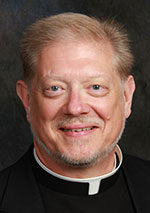That All May Be One / Fr. Rick Ginther
Sacred friendship conversations build bridges in ecumenism
 The Week of Prayer for Christian Unity from Jan. 18-Jan. 25 recently ended. Many Christians in our country petitioned God for more progress to be made to fulfill Jesus’ mandate “… that all may be one” (Jn 17:21).
The Week of Prayer for Christian Unity from Jan. 18-Jan. 25 recently ended. Many Christians in our country petitioned God for more progress to be made to fulfill Jesus’ mandate “… that all may be one” (Jn 17:21).
This year, they prayed for doing good and seeking justice (Is 1:17). A prayer service for Christian unity focused on such good and justice for Native Americans and people of color in our country.
It ended with a challenge for Christians who long for unity to work for unity through justice in the human family.
Ours was a stirring prayer at Christ Church Episcopal Cathedral in downtown Indianapolis!
Providentially, I was afforded an additional opportunity to focus on prayer with folks of other religions just before the Week of Prayer for Christian Unity began.
The board of the Greater Indianapolis Multifaith Alliance has made a commitment to nurture “sacred friendships” among its members.
Once a month, we gather with one of three groups by Zoom.
Our topic this month was on New Year’s resolutions. Do we find them valuable or not? Do we make them? If we do, are we successful? You may wonder how this topic lead to prayer.
It happened rather quickly. On a call with a Methodist named Sarah, Rabbi Aaron and Rabbi Brett, three of us discovered we eschew resolutions centered on food, exercise, weight loss, etc.
Instead, we found the common ground of New Year’s resolutions based in prayer.
I noted that each year I resolve to add more time to quiet prayer and another resource for personal prayer. This is my recommitment to my daily prayer routine.
This moved Sarah to note her daily devotions—Scripture reading, quiet prayer and the writings of spiritual authors. She does not make a New Year’s resolution, but rather a daily promise to be prayerful.
One of her favorite spiritual writers is Franciscan Father Richard Rohr.
She was not alone. Rabbi Aaron noted he, too, reads Father Rohr. He finds him challenging and insightful, but he does not always agree with him.
Rabbi Brett shared that he does make New Year’s resolutions in line with our culture. Yet his spiritual resolve is foremost.
He noted that Jewish prayer is “study” of the sacred writings—the Pentateuch, the whole of the Hebrew Bible, and the Talmud (rabbinic sacred writings).
Rabbi Aaron agreed. Their exchange led us to consider the Jewish concepts of Keva and Kavanah.
Keva, we learned, is prayer’s structure, framework and foundation. Jewish liturgical prayer is such a structure.
Kavanah is bringing our needs to God and sharing our deepest spiritual concerns with our community. Put another way, Kavanah emerges from the spontaneity of the heart, giving prayer intentionality.
Both Sarah and I echoed these two concepts in our denominational Christian prayer forms.
This led us then to discuss “spontaneous prayer.” Rabbi Aaron first encountered such in working with Christian, evangelical congregations. It was a form of prayer unknown to him at first. Over time, he became proficient.
This led to the remaining three of us to note our experience of the same: comfort, anxiety, flow of the Spirit and joy in such prayer.
Then we found ourselves exploring evangelical, non-denominational and non-liturgical communal prayer.
It was quite an hour—centered on our experience of communal and personal prayer in our lives! The ease of exchange and vulnerability in its midst was a gift.
At the end, we resolved to continue these sacred friendship conversations.
It was a very good way to begin the new year!
(Father Rick Ginther is director of the archdiocesan Office of Ecumenism and Interreligious Affairs. He is also the pastor of Our Lady of Lourdes Parish in Indianapolis.) †
 The Week of Prayer for Christian Unity from Jan. 18-Jan. 25 recently ended. Many Christians in our country petitioned God for more progress to be made to fulfill Jesus’ mandate “… that all may be one” (Jn 17:21).
The Week of Prayer for Christian Unity from Jan. 18-Jan. 25 recently ended. Many Christians in our country petitioned God for more progress to be made to fulfill Jesus’ mandate “… that all may be one” (Jn 17:21).